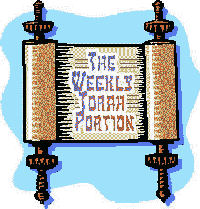Search our Archives:
» Home
» History
» Holidays
» Humor
» Places
» Thought
» Opinion & Society
» Writings
» Customs
» Misc.
|
Sensible Symbolism
By Michael Chessen
This week's Torah reading, Ki Tisa, weighs heavily upon our physical
senses, perhaps more so than any other portion of the entire Five Books of
Moses. The only sensual experience God appears to have originally chosen
for us to experience, however, comes near the beginning of Ki Tisa in the
guise of the heavily fragrant anointing oil and incense for use in the
Tabernacle. The subsequent experiences of the senses, for their part,
constitute a direct contradiction to God's plans for the Jewish people,
namely the events which surround the sin of the Golden Calf.
Whereas the
wondrous events surrounding the Exodus from Egypt were certainly visually
striking, they were nonetheless expressions of the will of God, and
therefore our grasp of their message moves beyond superficial physical
perception to an understanding which is both intellectual and spiritual.
The humanly contrived sin of the Golden Calf, however, seems
intellectually
unfathomable, and we are left rubbing our eyes in disbelief at the
spectacle we behold.
The trouble begins when the people "see" (by way of apparently
erroneous calculations) that Moses is perhaps due not to return from his
ascent to Mt. Sinai. They then request Aaron to fashion them an oracle, or
idol, to visually stand as the object of their worship. When Moses comes
within earshot of the people's ensuing idolatrous revelry, he and Joshua
differ as to how to define the "spiritual static" which they hear. The
younger and somewhat zealous Joshua discerns the sounds of war (and if war
is indeed "hell" then it's terrible din would stand in direct negation to
the heavenly music of King David's psalms).
Moses, however, has a somewhat
more prophetic insight into what is happening and perceives the uproar as
simple singing without soul.
The commentator Nachmonides sees the sin of the Golden Calf as not
necessarily intended idol worship, but the unfortunate result of a
mistaken
search for spiritual symbolism. Whereas God Himself had already supplied
us
with abundant symbolism in the divinely ordained instructions for the
construction of the Tabernacle, the Jewish people should not have seen
this
as constituting any kind of a license to independently innovate new
symbols
on their own.
In addition, Moses' first glimpse of the Golden Calf comes
as
he is descending from Mt. Sinai with perhaps the most powerful single
religious symbol in all of Jewish history, namely, the Tablets. In
smashing
the Tablets Moses not only expresses great anger, but also powerfully
conveys the message that if the people are incapable of using symbols to
worship God without crossing the threshold into idolatry, they will then
have to do without any physical symbols whatsoever. However, after having
yielded to Moses' fervent plea to pardon the people, God Himself not only
sees to the recreation of the Tablets, but also sends the people a further
visual sign reflecting the intensity of the spiritual experience which
Moses has just undergone as the leader of the Jewish people.
Unbeknownst
to
Moses, he returns to the people with rays of light radiating from his
face.
God seems to be telling us that physical symbolism does have its place in
religious life, but however inspiring, it must also be spiritually
sensible.
Wishing you all a Shabbat Shalom !

|
|
Please let us know if you see something unsavory on the Google Ads and we will have them removed. Email us with the offensive URL (www.something.com)
|





|
